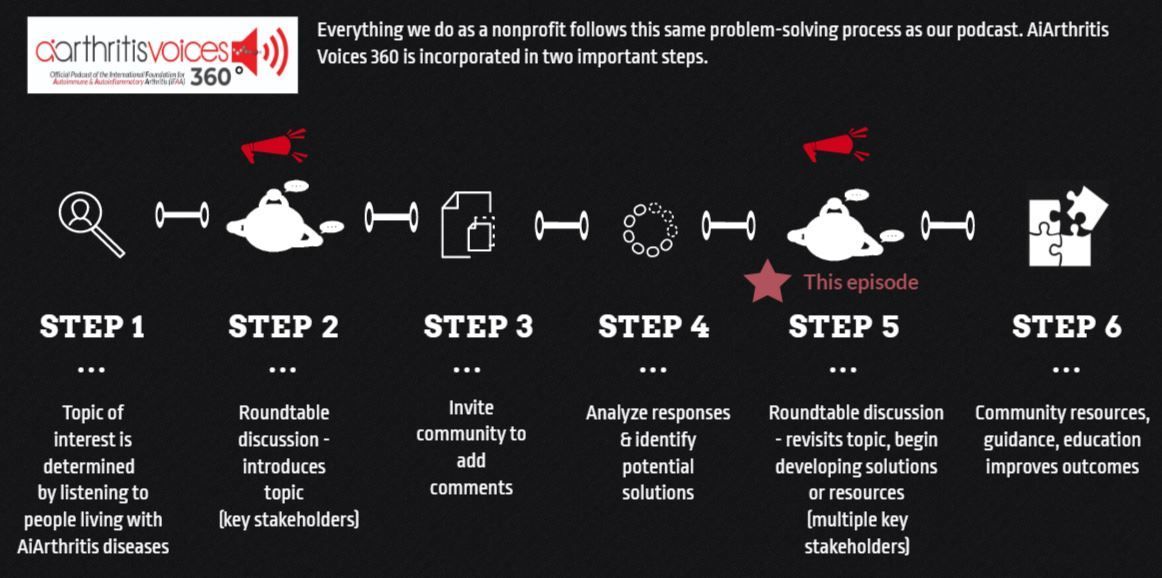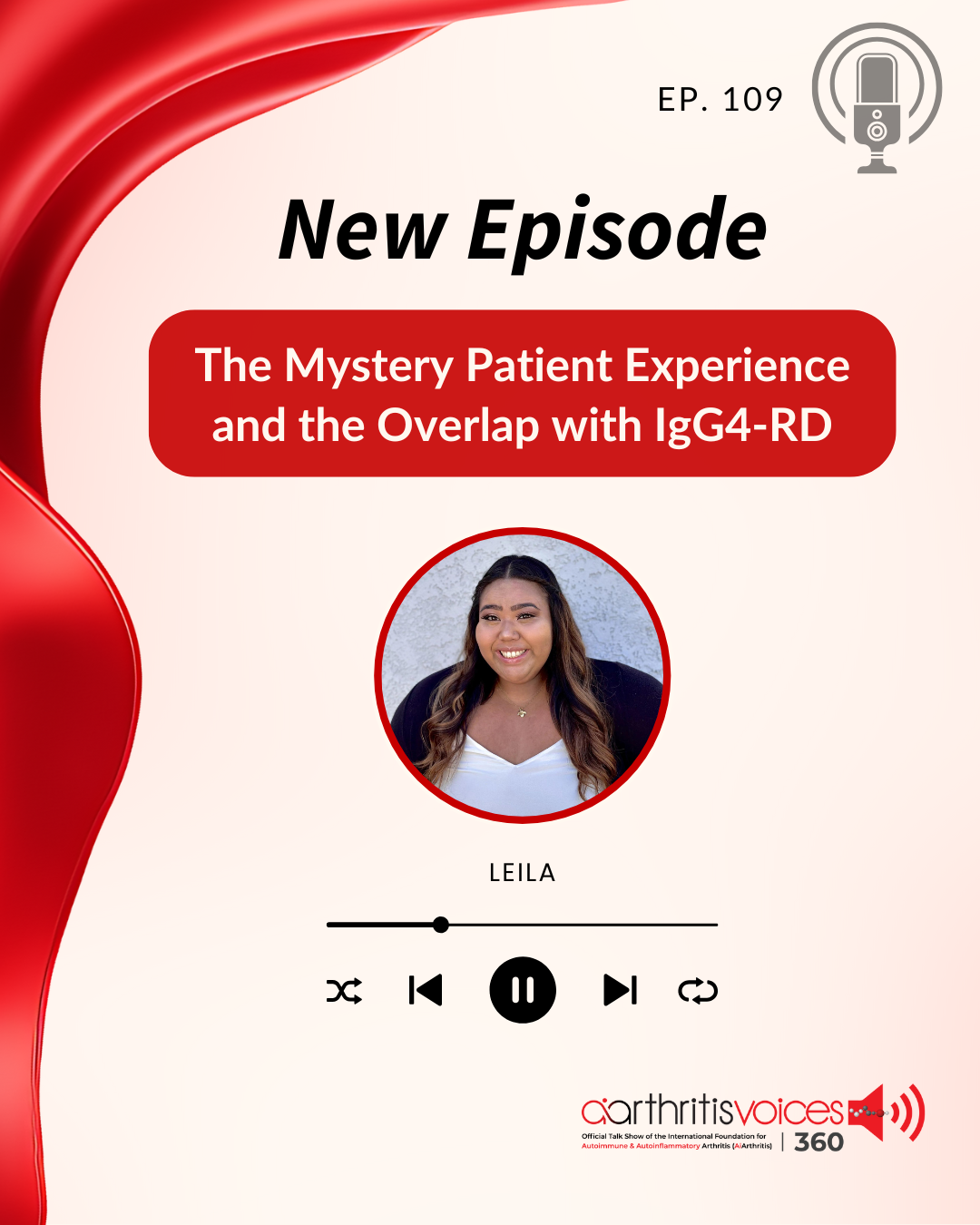Ep 109-1
Leila: [00:00:00] Hello everybody and welcome to AiArthritis Voices 360. This is the official talk show for the International Foundation for Autoimmune and Autoinflammatory Arthritis, or AiArthritis for short. My name is Leila and I am your host. Today I am a person living with Lupus and Sjogren's Disease, and I am the health education manager here at AiArthritis.
Today I'm going to be talking about a part of our community that sometimes does not get enough attention and resources, and that is the undiagnosed slash misdiagnosed or mystery patient part of the community. This episode is a step five episode in our problem solving process, meaning that we are revisiting the table and reintroducing patient infused solutions that were presented on previous episodes.
This topic has been brought to the table several times in the history of AiArthritis Voices 360 as early as episode [00:01:00] one, we've discussed being a mystery patient, and even as recently as episode 90, we discussed delays in diagnosis and personal diagnosis stories.
And now from those episodes we have come up with some patient infused solutions that we are able to present to the community and some that we wanna tell you about that are still in the works.
Ever since AiArthritis was founded, we have been dedicated to serving the undiagnosed community because our founders and many of the people they connected with started as mystery patients who were searching for answers for years. Many of them were diagnosed rediagnosed and were told that it was all in their head.
And this is still an all too common occurrence today. Here at AiArthritis, we are creating projects and programs to help break down the walls or barriers when it comes to diagnosis and help to educate both healthcare providers and the public of our diseases and how important early [00:02:00] detection and treatment are.
We are so grateful to have partners that are invested in elevating this initiative with us, and we want to give a shout out and huge thanks to the Amgen rare team for the support to make this episode, and many of our mystery patient resources happen. I wanna move into a story that we received in the past few months of a mystery patient looking for diagnosis.
He gave me permission to paraphrase his story and change his name for privacy reasons, but nonetheless, we wanted to share his story because it's super relatable to maybe many of your journeys or many journeys that occur with AiArthritis, diseases in general.
All righty. So his story goes. My name is Steve, and for most of my life I've been searching for answers. My chronic illness journey began when I was just 14. I dealt with multiple surgeries for pilonidal cyst disease, painful recurring infections near [00:03:00] my lower back. After a major surgery at 16, the cysts were finally under control, but when I woke up, I couldn't put weight on my right foot.
Okay. That moment marked the beginning of chronic pain that I, that never really left. At 15, I was diagnosed with juvenile fibromyalgia. I completed an intensive rehab program and for a short while, the pain improved, but it didn't last. Over the years, I bounced between providers, each offering different explanations, but none that truly fit Rheumatoid arthritis was rule out early.
Imaging found a tiny bone tumor, but it turned out to be benign. I was told I had snapping hip syndrome. Then from fibromyalgia again, at one point my doctor believed I had an autoimmune disease. We ran tests ESR, CRP, ANA, HLA 27, but everything came back normal. I frustrated. I asked for referrals.
Pain management labeled a chronic pain syndrome. Another [00:04:00] provider said it was all in my head, but I knew better. My body was telling me something wasn't right. Emergency room doctors suggested inflammatory sacroilitis, possibly even Crohn's disease with inflammatory arthritis. A gastroenterologist suspected celiac disease, but tests came back normal.
Eventually, my CRP levels spiked significantly, and now I'm waiting for a colonoscopy to investigate further. Meanwhile, my rheumatologist found mild osteoarthritis in my knees, but dismissed the bigger picture. She blamed my symptoms on sleep apnea and depression even though I live with psycho affective disorder.
I knew this pain was real, not psychological. Therapists who understand chronic illness backed me up depression doesn't cause this kind of physical pain. Community support groups became a lifeline. Leaders from different patient organizations and friends with lupus and ankylosing spondylitis listened to my story.
They believed me when doctors didn't. [00:05:00] They saw the signs of inflammatory arthritis, possibly psoriatic psoriatic arthritis with IBD involvement. Last year, I was also diagnosed with pots after collapsing. It was validating to hear. I finally have a diagnosis for at least one part of my struggles, but the full picture is still incomplete.
I'm still waiting this time for an MRI to continue the search for answers. Through it all my symptoms persist. Deep joint pain, bloody bowel movements, extreme fatigue, bloodshot eyes, itchy, inflamed scalp movement, eases my pain, rest makes it work, steroids help, but aren't a permanent solution. I share my story because it reflects the journey of so many undiagnosed patients and those living in the unknown fighting daily to be heard.
And yeah, that is his story. And unfortunately, the story of many patients that we hear and get a lot of questions, um, from here at AiArthritis. [00:06:00] And unfortunately, it is so difficult to deal with these situations because every healthcare system is different. Every doctor is going to be different in what they think, um, the signs and symptoms or, or what even warrants a referral.
And I think that all we can do is really put together our experiences and give advice on how we were able to get our diagnosis once we were, um, like while we were on this journey and during episode 90 when we were talking about these different personal journeys of diagnosis, that's when we ideated the mystery patient guide. And so we've created our mystery patient guide as a collection of advice, guidance, tips, information from different patients that have told their story to AiArthritis, as well as filled out some forms on online, um, that [00:07:00] we've had out there for. Um, anybody diagnosed with our diseases to give advice to mystery patients?
And this is a living document. We're always looking for more people to help contribute, help give any insider advice that can be helpful for those who are searching for answers. And, um, we did give this patient, um. Our, our mystery patient guide to go over. And he gave us some great feedback that, um, we were able to
incorporate into it. And now we have version three of our mystery patient Guide available for download at www.aiaarthritis.org/undiagnosed. You'll be able to find all of our information about the mystery patient our previous. Talk show episodes as well as the form that you can also fill out to help give any advice to the mystery patients.
And as you can see from this story there's common [00:08:00] themes that a lot of people go through with having to go to multiple specialists, maybe having normal labs and not being able to pinpoint what it might be because the labs seemed normal at that time that they're being taken, pain being dismissed over and over and over again.
And a lot of misdiagnoses of fibromyalgia, um, or using psychological explanations or mental health explanations for these symptoms that they may be having. And so with all of these problems that we see in the diagnostic journey, we also additionally to the mystery patient guide have had this overarching a theme overarching project, um, overarching initiative that we've been working on and that we've talked on the talk show about before, which is our auto plus inflammatory arthritis equals X or YZ project where [00:09:00] auto means the symptoms that are coming specifically from autoimmune or autoinflammatory disease, um, which are like rash fever, flu-like symptoms, fatigue, brain fog and inflammatory arthritis symptoms of uh, joint pain, especially after times at rest or swelling and redness in the joints. And so with those two types of symptoms, we hypothesize that it can be one of our 22 diseases, an AiArthritis disease, or can be two other diseases, one of them being fibromyalgia, which many people with AiArthritis diseases are double diagnosed with fibromyalgia or have it as a coexisting condition um, or may have been misdiagnosed with that before. And as well as IgG4 related disease, which is a newer immune mediated disease, um, that was thought to be a part of Sjogren's syndrome before that we are seeing, being [00:10:00] diagnosed and, um, occurring a lot more after, um, the discovery a few years ago. And so we are focusing this project on, um, including the mystery patient guide, including this in the Mystery Patient Guide to help, um, let patients know that these symptoms, plus these symptoms could equal these diseases.
But as well as we want to create um, or we are in the process of creating healthcare provider education, um, whether that be a brochure, a little business size, business card sized tool, um, or just information card for patients to be able to give to their primary care doctors, nurses, or, um maybe even physical therapists who are helping them with their pain and just letting them know that, you know, this is why I am honing in on these diseases is because many people who have these diseases, they started [00:11:00] out just like me.
My blood not showing that I may have these blood markers. My imaging not showing that I may have these diseases, but they wait, you know, a few years, and it does get to that point where the blood is showing those markers. And just also letting them know how important early intervention, early detection is in terms of health outcomes after the diagnosis.
We've seen that and research, research has so shown that in the first six months after initial in onset of symptoms is a critical time to be able to receive proper treatment because the faster you're able to to get treatment, and specifically within those first six months, the higher the chance of remission is for those patients and the lower the chance of developing comorbidities um is as well. And so just really [00:12:00] emphasizing this and making sure that we are spreading the word to as many people as we can. And this brings in another project that is involved with this, which is our college awareness tour, where we are going in specifically right now into six different colleges in California and reaching out to cultural organizations, future Physicians of America organizations health, uh, public health organizations, anybody that will listen to us and get a 15 to 20 minute awareness presentation about our diseases is just making sure that we are being able to touch the public because before anybody is a patient, they are the public. And so if they maybe don't need this information for themselves, they may need it for a parent, another, another family member, a friend, a coworker, anybody um, because you know, one in 10 people will be. Diagnosed with one of our diseases and just [00:13:00] being able to catch that age group, um, and let them know as early as possible because onset of these diseases are anywhere from 20 to 40 years old. So being able to just have the knowledge that of these symptoms and what they could mean, could be really critical in, in somebody getting care, um, at the right time. And so, uh, as well as with that, um, project, we are looking to get insights from, um, people of color, specifically Latino, black and Asian communities, on why, um, there, or what barriers there may be to getting a diagnosis, um, as soon as possible or getting treatment, um, as soon as possible.
And so we are going to. Create the resources for the healthcare providers, um, just on the equation project itself, but then also have cultural, culturally competent insight to be able to [00:14:00] give these doctors or healthcare providers more context when it comes to, um, dealing with diagnosis and treatment for, for these specific cultural groups.
Along with the College Awareness Tour and the Equation Project, the Auto Plus Inflammatory Arthritis Project, we are also helping to bring awareness for IgG4-RD, which we said is one of the YZ parts of the equation, and I was able to go to an educational summit held by Amgen in, uh, at the end of February of this year, and was able to connect with a bunch of different patient organizations that we don't usually work with, um, that are in different disease states, having to do with the kidneys and with the pancreas and vasculitis and a bunch of different organizations for us all to learn about IgG4-Related disease.
And help to bring awareness that [00:15:00] there may be some people in our communities that are misdiagnosed with one of our diseases and may actually have IgG4. And especially because IgG4 is often, um, misdiagnosed as Sjogren's disease. Like I said before, um, IgG4 was actually thought to even be a part of Sjogren's disease at one point.
Um, it's also can be misdiagnosed as sarcoidosis, and those two are AiArthritis diseases. It's also, um, often misdiagnosed as ANCA associated vasculitis, which is an associated condition of ai, arthritis, and, uh, most commonly it's misdiagnosed as cancer. Um, lymphoma is one of the more, um, prominent ones that they get the misdiagnosis for, and so, um, just bringing the awareness to this specific disease, um, is super important because of how fast [00:16:00] it can escalate, um, in terms of affecting all of the different organs. There's so many different organs that can be, um, involved with this disease. Uh, the pancreas being the most, um, prominent and kidneys also being very common to be affected.
And during the patient panel, uh, we were able to learn. A lot more about what it's like to live with IgG4 related disease. And for a lot of them, it was one of their organs starting to not work, and that's how it was brought to them that they had this disease. And many times they were diagnosed with cancer and had to go through PET scans or, uh, biopsies and other diagnostic tools to see, um if it was cancer, and even sometimes when the cancer would come or the, the testing would [00:17:00] come back negative, they would still treat it as if it was cancer. And so getting the information out for this specific disease as well is super important. And I think that it's, um it works well, especially with our mystery patient guide.
And so in that mystery patient guide, we do add some information about IgG4 and specifically, um, for IgG Forward, which is the patient organization that is specific for IgG4. RD was able to meet the founders and the, and, um, the executive director, uh, Dr. John Stone and Catherine at the summit, and was able to talk to them about, um, potential collaboration and being able to just elevate each other's resources, um, to be able to help the IgG4 community.
And so, um being able to check out IgG forward seeing all of their [00:18:00] education and resources, um, they have an amazing. Amazing website with a bunch of different resources. And Dr. John Stone, um, spoke at the, um, at the summit that I went to and I learned so much and, um, I was able to really get a grasp of what IgG4 is, and I hope to be able to portray that in our resources and our, um, social media and our blog to be able to bring that awareness to the community. And I'm also ex really excited to give you all the news that, um, although for, for a while there, there was no FDA approved treatment for IgG4 and they were using similar, um, similar medications for our diseases or just, you know, using, um, steroids, which we all know is not a long-term solution.
Uh, so now umplizna [00:19:00] is a B-cell depletion therapy is now FDA approved as of the beginning of this month in April, um, or beginning of last month. And so that is super exciting that there's finally going to be, um, patients that are able to get treatment, um, for this disease that's FDA approved and specifically made for this disease.
And so that, um, that is an amazing, uh. It's an amazing thing to be able to see new treatments on the horizon and, um, new options for patients to be able to increase their quality of life, um, when living with this disease. And yeah, that is, um, that's pretty much it when it comes to IgG4, our Mystery patient guide, our Auto Plus Inflammatory Arthritis Guide, and, um, we will be doing this work for the rest of this year, and we'll be [00:20:00] announcing when all of these different resources are available for download.
We have an IgG4, um, awareness blog on our blog right now because it was IgG4 day on April 4th this month. And so, um, we wanted to help bring awareness there. And yes, let's see. Were you a mystery patient? Um, help us provide some insight or peer advice to be added to the mystery patient guide.
And again, you can see that@www.AiArthritis.org/undiagnosed, and you can also see all of the different stops of the patient journey while you are there.
Um, the patient journey is another initiative that we have where we are creating resources that are specific to those different stops of the patient journey, including undiagnosed, newly diagnosed disease management, coexisting conditions, support system, [00:21:00] and the road to remission. And so please go ahead and check out all those resources. Let us know what you think. And last but not least, I wanted to give some information about world Autoimmune and Autoinflammatory Arthritis Day, which is on May 20th.
And as you may know, we celebrate and drive awareness for 47 straight hours as May 20th passes through all time zones in the world. And, um. That is our big awareness day that we have every year. And May is super packed with lots of awareness because it also is Lupus Awareness Month. Axial Spondyloarthritis Awareness Month.
Bette's Awareness Day is on May 20th as well. And Arthritis Awareness month is the whole month of May in the us. And lastly, um, we have IBD, um, awareness, which is includes Crohn's, which is one of our diseases as well. So [00:22:00] there is so much awareness to be, um, raised next month, and we have two in-person events actually going on, which is very exciting for AiArthritis because this is new and really exciting.
We are gonna be having events on May 7th and May 20th in St. Louis. So if by any chance you are in St. Louis. Please go to AiArthritis.org/AiArthritis day to get more information about these events. We will be racing remote control cars, um, and donating those remote controlled cars at the end to JIA patients.
Okay, and if you would like to help us raise funds and help further our mission, you can go to give butter.com/AiArthritis day 25 to start your own race team and invite your family and friends to donate and race awareness. Lastly, you can join our hashtag auto [00:23:00] Arthritis campaign by posting anything having to do with cars on your social media from May 7th to 21st to help us drive up the visibility of our diseases by making people question why is there so many cars on the timeline? What does this have to do with anything? Um, we want to flood that hashtag, hashtag auto arthritis to bring people to our page to let them know what we're raising awareness for, for AiArthritis diseases, and, um, early detection and early diagnosis of those diseases.
So again, uh, for check to check out everything that's going on for World Autoimmune Autoinflammatory Arthritis Day on May 20th. Check out AiArthritis.org/AiArthritis day. And at AiArthritis, we don't just represent the patient voice. We are the patient voice. And with your support, we can amplify it even further.
[00:24:00]
If you found value in this talk show, consider making a donation to help us continue producing impactful conversations, bringing all stakeholders to the table to discuss patient identified issues and patient infused solutions, visit www.AiArthritis.org/donate to help us make a difference together.
Thank you again for tuning into this episode of Air Arthritis Voices 360. You can find AiArthritis on all major social media platforms at IF AiArthritis, and that's a wrap. We'll see you here next month.
On the next episode of AiArthritis Voices 360.














